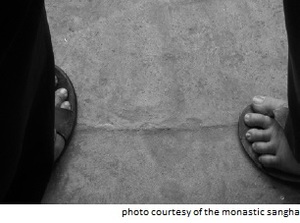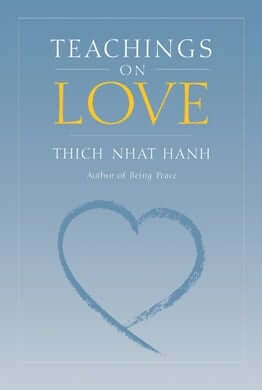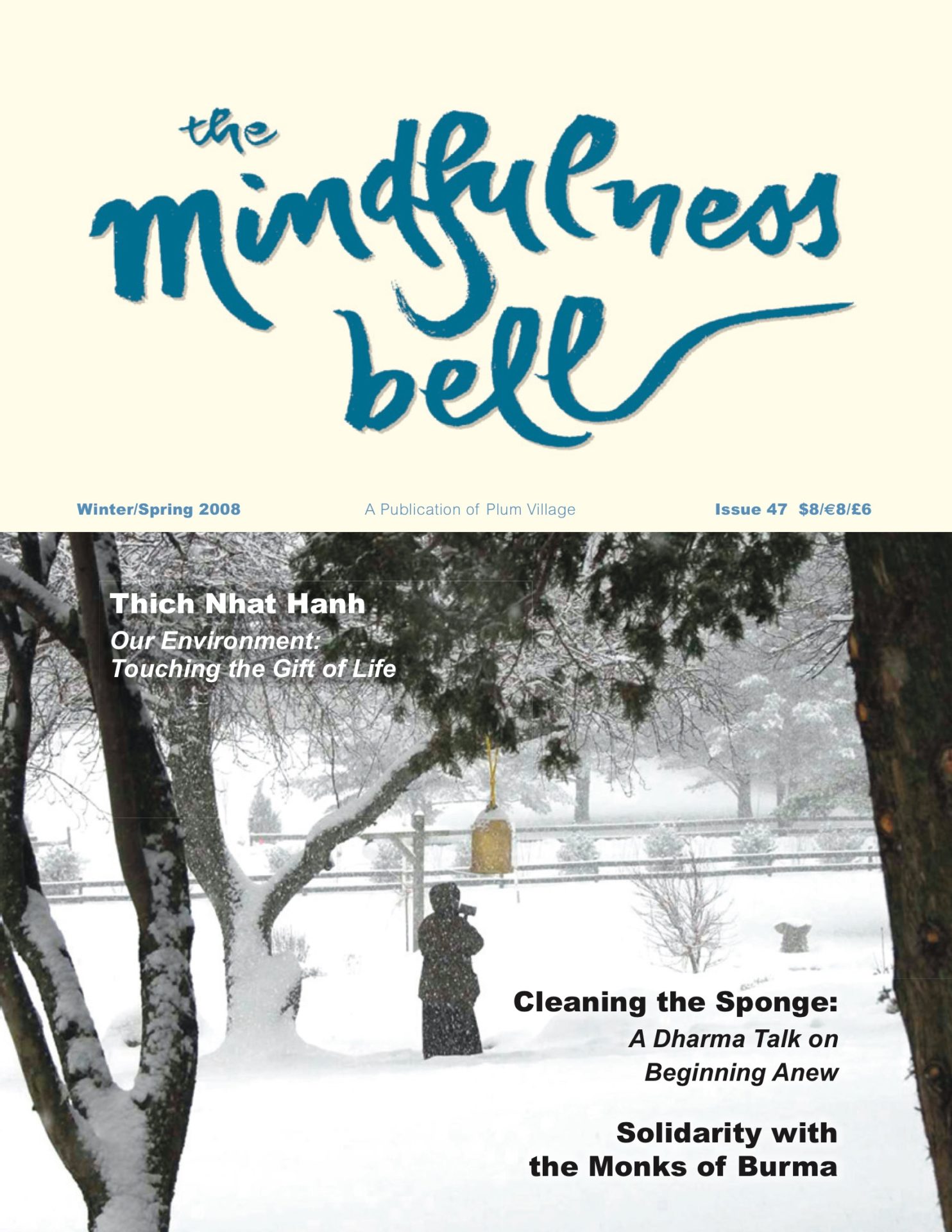By Jane Ellen Combelic in February 2008
We need to create environments where people can succeed in the practice. Interpersonal relationships are the key. With the support of even one person, you develop stability, and later you can reach out to others. —Thich Nhat Hanh

I sit on the patio across the table from my housemate of three weeks, Carol. A vase of orange and white cosmos,
By Jane Ellen Combelic in February 2008
We need to create environments where people can succeed in the practice. Interpersonal relationships are the key. With the support of even one person, you develop stability, and later you can reach out to others. —Thich Nhat Hanh

I sit on the patio across the table from my housemate of three weeks, Carol. A vase of orange and white cosmos, pink zinnias, and blue salvia sits on the table; a candle burns fitfully in the warm evening breeze. Carol and I sit in silence a few moments, eyes closed, and then I invite the bell.
This is our first session of Beginning Anew.
We’ve rented a big old house together in the middle of town --she, escaping from the dissolution of a twenty-five-year marriage; me, leaving the refuge of my mother’s house a block away, where I had lived since my return from Plum Village. We don’t know each other very well and before we moved in together, I told Carol I wanted to have a weekly “house meeting” to do a practice called Beginning Anew. At Plum Village I had frequently heard Thay speak about the importance of doing this practice once a week with one’s family or partner.
I know myself well enough by now (there are blessings to growing older) to accept that I like things done a certain way. I have extremely high standards, for myself and everyone else — this is a blessing in my work as an editor, it’s a curse in my relationships. I also tend to hold things in, especially irritation and hurt and anger. I would ten times rather turn it against myself than hurt someone’s feelings. So when something bothers me—like dirty dishes in the sink, clutter on the dining table, or a messy cupboard—I don’t speak, I seethe.
Moving in with Carol I knew that I needed some formal process for resolving whatever differences might arise. Little did I realize that the process of Beginning Anew would produce miracle after miracle and become in itself an essential part of my spiritual practice.
The Pull of Community
During half of my adult life I’ve lived alone. In recent years, especially since my fourteen months in and around Plum Village, I’ve felt drawn to living in community. In one Dharma talk at Upper Hamlet Thay said that lay people should try living together, in order to share resources, live more simply, and learn to co-exist in peace. “I hope,” he writes in Teachings on Love, “that communities of practice [like Plum Village] will form in the West, with the warmth and flavor of an extended family, as brothers and sisters, uncles and aunts… We have to work together to find ways to help each other. If we can do that, everyone will enjoy the practice.”
This is one of Thay’s most important teachings, one that he has made manifest through his monks and nuns in Plum Village and the other monasteries: it is possible — and necessary — to live together in harmony and love.
To live in harmony one needs three things, as I see it: a spiritual foundation, a conscious intention to create community, and tools for resolving conflict. As Carol and I discussed living together I wanted to make sure that these conditions were present. Carol is fairly new to the practice but she loves Thay’s books, enjoys meditation and yoga, and expressed a keen desire to learn more and to experiment with our spiritual community of two.
I’m happy to play teacher, but I really have no idea what I’m doing. Except for the ritual Beginning Anew ceremony practiced in small groups during retreats, I’ve never actually done Beginning Anew. I’ve heard Sister Chan Khong and other Dharma teachers explain it, I’ve read about it in Anger, in Joyfully Together, and on the Deer Park website [see sidebar page 26], but that’s a far cry from doing it.
Doing the Practice
While Carol and I sit silently in our back yard, serenaded by robins and finches, I pray for guidance. Returning to my breath,
I pray that I might speak the words that need to be spoken while holding back those that do not. A deep peace fills me, trust in the truth of the Dharma.
We begin.
On a piece of paper I have written out the four steps as I understand them:
- Flower watering
- Expressing regrets
- Hurts/anger/peeves (I added that last part)
- Asking for help
I take the first turn. Timidly, I look at Carol and tell her what I like and admire about her: her courage in the face of great emotional strain, her devotion to her two young adult children, her sense of humor, her delicious cooking, her easy-going nature. I can tell she is pleased, and when she takes her turn to water my positive seeds, I feel the same. It’s wonderful to be openly appreciated!
Next I express my regrets. Life has been pretty smooth these first three weeks together, but in my own head the Judge and Jury have convicted my gentle housemate on a variety of counts. Leaving crumbs on the kitchen counter — guilty. Loading the dishwasher wrong — guilty. Speaking to me in the morning when I want to be left alone — guilty. Of course these petty concerns are too silly to mention, so I never say anything to her at the time, and the trial just goes on in my own mind, endlessly. It is exhausting, and also cumulative, as I find the irritation getting closer and closer to the surface as it grows. So I express the regret that I have a very critical mind, and it is a struggle for me to relax and live with a little disorder, with someone else’s habits. Carol then expresses regret that she has been emotional lately, prone to fits of weeping and rage toward her inexplicably cruel ex-husband.
We haven’t quite mastered deep listening yet, so we interrupt and reassure one another that we understand. In later sessions we will use the flower bouquet as a “talking stick” and try not to interrupt. But for two people who love to talk, that’s an ongoing challenge.
Now comes the really really hard part: expressing angers and hurts (and pet peeves, of which I have hundreds, thousands). I’m embarrassed to do so, but I mention just a couple of my concerns, mostly involving the kitchen, which don’t phase her in the least. She frowns at first, then smiles. Then it is her turn, and she says she wishes I weren’t quite so grumpy in the morning. I can live with that.
The fourth step comes to us easily: I ask for help in being more flexible and easy-going, she asks for help being more calm and centered. We stand, both of us glowing, and hug. What’s happened for me is that in the space of forty-five minutes our relationship has deepened from a casual cohabitation to a spiritual friendship. There’s a level of trust between us, that came from sharing painful and scary things, that might have taken years to establish without this process.
The Blessings of Beginning Anew
Because we understand each other better, we have more compassion. As the calligraphy in the meditation hall at New Hamlet says so beautifully, “Listen well to understand deeply, look deeply to love well.” Because we are learning to love our little Sangha of two, we want the other person to be happy. Carol tries to accommodate my need for order, and I’ve let go of a lot of my pet peeves. Amazingly, I’m even learning to speak up—skillfully—when something really does bother me.
An even bigger miracle occurred during our third Beginning Anew. Several weeks had passed since our second session — in spite of our intentions, we don’t manage to do it weekly — and my irritation at small things was eating away at me. On this day, I really needed to do Beginning Anew. It was her turn to start, and when she came to the second step she hesitated a long time. Then she confessed that she had done something she regretted deeply: on her husband’s birthday earlier in the week, with her family celebrating in a nearby restaurant without her, she had started feeling suicidal; while I was at our weekly Sangha she overindulged in alcohol (neither one of us ordinarily drinks). I knew nothing of any of this until Carol tearfully confided it during Beginning Anew.
Immediately my irritations vanished, to be replaced with a wave of compassion and tenderness. We talked, listening deeply to one another and providing support for each other’s healing. In the sacred space of the ritual, surprising insights arose, as if the process took us to a deep place of shared wisdom.
Several months have passed since then, and we are scheduled to do Beginning Anew tomorrow morning. We’ve become rather lax, and we paid for it the other day when we had our first fight. Of course it was over something relatively minor, and we’re both sorry we lost our tempers. We’ve patched it over, but I’m looking forward to working through it more deeply.
Well, it’s not entirely true that I’m looking forward to it. Beginning Anew is not easy, especially for those of us who never learned how to express our anger and hurt. It’s a challenging practice, but one that yields profound results, and not for ourselves alone. “We should live our daily lives,” writes Thay, “so that there is Beginning Anew in every minute. If everyone practices, there is hope for the future. Look deeply to make renewal possible. Sangha building is the most important art for us to learn.”
In our little community of two, I am looking deeply at my expectations, my irritations, my control issues — the neurotic dance of my mind. Beginning Anew is a powerful tool for manifesting the practice of mindfulness in relationship. It’s allowing me to have more trust, more love in my life.
And a messy kitchen no longer summons the Judge and Jury. I can actually walk through it and smile. Such freedom!

All quotes in this essay are from the “Community” chapter of Teachings on Love, Parallax Press, 2007.


